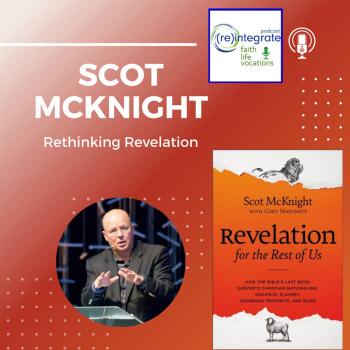My Responses to David Gushee
Sebelius v. Hobby Lobby Stores … Some are hailing it as a victory for religious freedom; others are decrying it as a trespass on women’s health rights. There are many other concerns that have been raised by the case such as to the limits (if any) of corporations being given human rights and the limits (if any) of institutions from claiming religious freedom from providing other important services to their employees. And on and on it goes. This is not a simple issue, and the pundits on the right and the left do not do anybody any favors when they oversimplify something with so many layers and nuances, or when they call the other side names or drench the opposition’s legitimate concerns with presumptions of their devious intentions.

David Gushee (Distinguished University Professor of Christian Ethics and Director of the Center for Theology and Public Life at Mercer University) is somebody that approached the issue with nuance and respect. I’ve respected Gushee for years because he truly seeks to be a centrist (you should order The Future of Faith in American Politics: The Public Witness of the Evangelical Center from Hearts & Minds). He is pro-life. He actively seeks to help Christians embrace peaceable solutions to international conflicts. He seeks justice for the marginalized and the poor. He advocates for the care of God’s creation. He champions personal ethics and piety, including such hot-topic issues like sexuality. He does not shy away from civil rights issues. He is one of America’s best Ethicists (I just love his book Kingdom Ethics: Following Jesus in Contemporary Context, written with Glen Stassen).
So when I read his post on the Hobby Lobby case, “Do for-profit corporations have religious liberties?”, (published before the ruling on April 8, 2014) at ABPnews/Herald, I thought that he presented a balanced treatment of the issues (please follow the link and read his thoughtful article). I thought that he raised some legitimate concerns about the ramifications of this case. And I also thought that somebody should seek to respond to those concerns because the case was won by Hobby Lobby and we are now having to face what comes in light of the decision.
So below are David Gushee’s questions from the ABPNews/Herald article, and my attempts to answer them. I would love the opportunity to dialogue with David about this. He is someone who would be an incredible conversation partner.
Gushee: Do we really want to blur the line between the legal status of for-profit corporations over against churches and religious ministries?
Bob: Gushee asks a very good question. There are reasons why churches and religious ministries are seen in a different light than for-profit corporations and why they are not taxed like for-profits are. We had better be careful with blurring these lines.
However, the issue is more nuanced than what I’ve been reading from both the Left and Right on what Corporations are and what they do. Gushee himself, earlier in this article wrote,
“The whole point of establishing a corporation is to create an entity separate from oneself to limit legal liability. Therefore, Hobby Lobby is asking for special protections/liability limits that only a corporation can get on the one hand, and special protections that only individuals, churches and religious organizations get, on the other. It seems awfully dangerous to allow corporations to have it both ways.”
Is this really the “whole point” of establishing a corporation? Corporations are established for a whole lot more reasons than just fiscal concerns and for limiting liability. As Stephanie Summers writes at Capital Commentary, this is a simplistic definition of business institutions in society.
“This is not God’s intention for the enterprise. Norms for businesses include a responsibility that governs economic activity in relation to other human responsibilities, and embodies principles like thrift –using money and resources carefully and not wastefully — and stewardship, among others. We should remember this fulsome purpose, rather than imagining Hobby Lobby as merely a caricature out to stick it to their employees in an effort to make a buck.”
Gushee: Is there really no difference between an individual with an eternal destiny, a church with a Great Commission mandate, and a for-profit business? What does that say about our theological (and legal) understanding of persons and the church?
Bob: Well, there are clearly differences between individuals, churches, and for-profit businesses, and nobody is saying that there isn’t. They each have different mandates and purposes, and those differences vary not only between these three categories, but between the individuals, the churches, and the businesses themselves.
But let’s think about the nuances of this further: Churches are made up of individuals that share the same mandate and purpose. Corporations are also made up of individuals that share the same mandate and purpose.
For instance, you have a family that are members of XYZ Church. They gather on Sundays to worship, hear preaching, and partake of their sacraments. They learn that their mandate is what Gushee calls “The Great Commission” (to “go and make disciples of all nations,” see Matthew 28:16-20), but that is not all that they learn. They are also taught that to be Christian is to love their neighbors as themselves (Matthew 22:39) and to seek the welfare of their city (Jeremiah 29:7). So, corporately with the rest of their church, they do projects that help the needy of their city. But also, as individuals and as a family, they seek to work for the common good through their various vocations.
This family owns ABC Company, and the reason they have built the company is to love their neighbors and help their community flourish. They do not have as their main reason for being the making of money, though is it a for-profit business and they feel that commerce is one of God’s gifts to society. They see their business as an extension of their faith – and they are inviting others to participate with them in their venture to be a blessing through their institution.
So, this family is a part of two institutions—XYZ Church and ABC Company—and both have the same religious mandate: To love their neighbors and to seek the welfare of their city. Don’t both institutions merit the same protections for religious freedom from the government?
As Justice Kennedy wrote in his concurring statement,
“Freedom means that all persons have the right to believe or strive to believe in a divine creator and a divine law. For those who choose this course, free exercise is essential in preserving their own dignity and in striving for a self-definition shaped by their religious precepts. Free exercise in this sense implicates more than just freedom of belief. It means, too, the right to express those beliefs and to establish one’s religious (or nonreligious) self-definition in the political, civic, and economic life of our larger community.”
In other words, contrary to what I hear from many of the voices on the progressive and/or liberal side, religion is not simply a group of people getting together privately to worship. Justice Ginsburg makes this mistake in her dissent when she wrote,
“Religious organizations exist to foster the interests of persons subscribing to the same religious faith.”
No, religious organizations often exist to bless others that are not of their faith. I love to drive through cities that I’ve never been before, discovering what there is to discover. In just about every city, I come across hospitals that were established by religious faiths – Catholic, Methodist, Jewish, Presbyterian, etc. If religion was meant to only “foster the interests of persons subscribing to the same religious faith,” then Jews, Muslims, or Atheists would be turned away from the entrance to New York Presbyterian Hospital, the largest hospital in the country.
It is the Christian mandate to love our neighbors and to seek the welfare of our communities. The reason Reintegrate exists (yes, we are a non-profit religious organization) is to help Christians do just this, not just within the confines of their churches, but primarily through their vocations. The Free Exercise of Religion is actually good for the country because it frees people up to bless others as they live out their faiths in the public. It has always been the interpretation of the Supreme Court the the First Amendment goes further than the freedom of individuals to gather in private worship. It has always been understood that Americans have the freedom to exercise their religion in all aspects of their lives.
And yes, some closely-held companies have the explicit goal of loving their neighbors and seeking the welfare of people outside their faith. They are not just greedy corporations that have profit as their only motivation.
Gushee: Wouldn’t a win for Hobby Lobby really mean that we would be ensuring that the religious convictions of the one (business owner/family) would then trump the needs (and convictions) of the many (everyone who works for that business)? Do we want to give business owners that kind of power? Cuius corporatio, eius religio?
Bob: This would be a legitimate concern, but the way the ruling ended up reading, the business owners’ needs will not trump the employees’ needs. The ruling states that closely-held corporations can often exist for religious reasons, and therefore (because of the Religious Freedom Restoration Act), the government cannot burden the exercise of their religious beliefs if it can find another way of achieving the state’s interests. In other words, the employees’ access to the totality of the ACA’s health care mandate remains intact – the government must provide alternative ways for the birth control methods in question to be had.
In this way, the burden is alleviated from Hobby Lobby and it does not burden the person wanting certain kinds of birth control. Therefore, there are no needs/convictions of the individual at stake here. I simply don’t understand how Justice Ginsberg (in her dissenting opinion) can contend that “the exemption sought by Hobby Lobby and Conestoga would…deny legions of women who do not hold their employers’ beliefs access to contraceptive coverage” That simply is not the case.
Gushee: What happens when, say, a Christian Scientist company owner decides not to cover any health benefits, or a Jehovah’s Witness company owner decides not to cover blood transfusions, or an anti-vaccination owner decides not to cover the MMR shots, or perhaps a trust-Jesus radical decides not to contribute to employee Social Security or a 401(k)? Do we really want to open up that Pandora’s Box?
Bob: Yes, a Pandora’s Box it is.
It’s too bad that this box had to be opened, but the Affordable Care Act forced it open. When the government makes mandates, it must be willing to acquiesce to religious freedom concerns.
The latest example is the pending Executive Order from President Obama that will prohibit federal contractors from discriminating in their hiring based on sexual orientation or gender identity. Many non-profit religious organizations are in partnership with the federal government to provide social services such as housing, disaster relief, hunger alleviation, and education. Why should they be required to hire somebody that does not accept their religiously held convictions concerning homosexuality? And if there is a religious exemption granted to non-profits, will we see yet another Supreme Court hearing on whether or not this holds true in the case of for-profits?
We’ll see what other new developments arise. This is going to be a bumpy ride.
Gushee: Are critics taking seriously the public health benefits of no-cost contraception coverage, and the moral benefits of the likely dramatic reduction in the number of unplanned pregnancies and abortions? Or does their principled objection to contraception and/or (perceived) abortifacients totally trump data related to the actual impact of no-cost access to contraception?
Bob: This is another good point, David. Yes, I know of a study done by the Washington University School of Medicine. It reports,
“Providing birth control to women at no cost substantially reduces unplanned pregnancies and cuts abortion rates by a range of 62 to 78 percent compared to the national rate.”
For those of us who are “Pro-Life” (i.e., against abortion on demand), we should seek to reduce unplanned pregnancies in any way possible. The Centers for Disease Control and Prevention found that family planning was one of the greatest public health achievements of the twentieth century. They report,
“Smaller families and longer birth intervals have contributed to the better health of infants, children, and women, and have improved the social and economic role of women… Modern contraception and reproductive health-care systems that became available later in the century further improved couples’ ability to plan their families. Publicly supported family planning services prevent an estimated 1.3 million unintended pregnancies annually.”
They also add,
“Noncontraceptive health benefits of oral contraceptives include lower rates of pelvic inflammatory disease, cancers of the ovary and endometrium, recurrent ovarian cysts, benign breast cysts and fibroadenomas, and discomfort from menstrual cramps.”
I’ve read many who claim that Hobby Lobby’s worry that Intrauterine Device (IUDs) and morning-after pills are abortifacients is simply contrary to science.
But a simple Google search on IUDs took me to WebMD, where I read,
“How it Works. Both types of IUD prevent fertilization of the egg by damaging or killing sperm. The IUD also affects the uterine lining (where a fertilized egg would implant and grow).”
And
“Hormonal IUD. This IUD prevents fertilization by damaging or killing sperm and making the mucus in the cervix thick and sticky, so sperm can’t get through to the uterus. It also keeps the lining of the uterus (endometrium) from growing very thick. This makes the lining a poor place for a fertilized egg to implant and grow.”
As Jonathan Adler, a law professor at Case Western University, wrote in the Washington Post ( “No, the Supreme Court’s Hobby Lobby decision is not based upon a scientific mistake”),
“The Food & Drug Administration’s website notes that all four forms of disputed contraception may prevent implantation, as do the FDA-approved labels (as noted in footnote 4 of the government’s brief).”
When there is so much medical doubt, a Christian’s conscience must be allowed.
That being said, women should be legitimately concerned when institutions seek to limit their health care options. I understand how women’s rights groups have been up in arms about this ruling.
As with all public justice issues, the rights of one sector of the citizenry often butts up against the rights of another. It is the government’s role to find the right path through this as new laws are passed and new concerns arise. With the passing of the Affordable Care Act, we found a new concern arise, something that we hadn’t ever faced before – how do we negotiate a woman’s right to health care with a family’s right to religious conscience?
Gushee: Do we see any legitimate role for government — e.g., our elected representatives in Washington making public laws to advance public purposes, including public health? Or has anti-government libertarianism entirely eroded such convictions?
Bob: I certainly hope that libertarianism has not caused too much erosion, especially among Christians. We must remember that “the one in authority is God’s servant for your good” (Romans 13:4).
That being said, we must also remember that government is not the ultimate authority.
When the government does new things for the sake of the public good, it will inevitably find itself rubbing up against other institutions in society like businesses, media outlets, medical institutions, and, yes, religious institutions. Each institution has its own unique role in society, and we should not expect government to have authority in the spheres that are not its primary purview. Each sphere in society must have its own sovereignty.
There must be checks and limitations on government, just as there must be checks and limitations on the other institutions in society (including churches and NPOs).
Gushee: Can we see (again) how the effort to mediate the delivery of access to health care through company health plans is really problematic? A single-payer government plan would take the corporate religious liberty issue completely off the table.
Bob: Amen, David. This whole train wreck points to the foundational problem that this case brings to light: Our novel, unique, and broken system for providing health care. Our health care system is the result of accidents in history. Of all the nations in the industrialized world, only the United States has this odd insurance set-up where employers are given the responsibility to offer health coverage.
This sets up these kinds of problems, from smaller companies not having much choice in their health providers to health plans decided by corporate financial officers who care more about the profits than employee well-being to situations like this. As Michelle Crotwell Kirtley wrote at Capital Commentary, “In front of the Supreme Court, some women carried signs saying ‘Birth control: not my bosses’ business,’ and I couldn’t agree more.”
What we need is health insurance reform that eliminates this employer middle-man mess and places health care decisions in the hands of the people and their health care providers. This is what I was hoping would come in the Affordable Care Act, but because of unwise and short-sighted political maneuvering, it fails to accomplish this.
Perhaps rulings like this will make us as a nation reassess our health insurance delivery system and finally change it.













